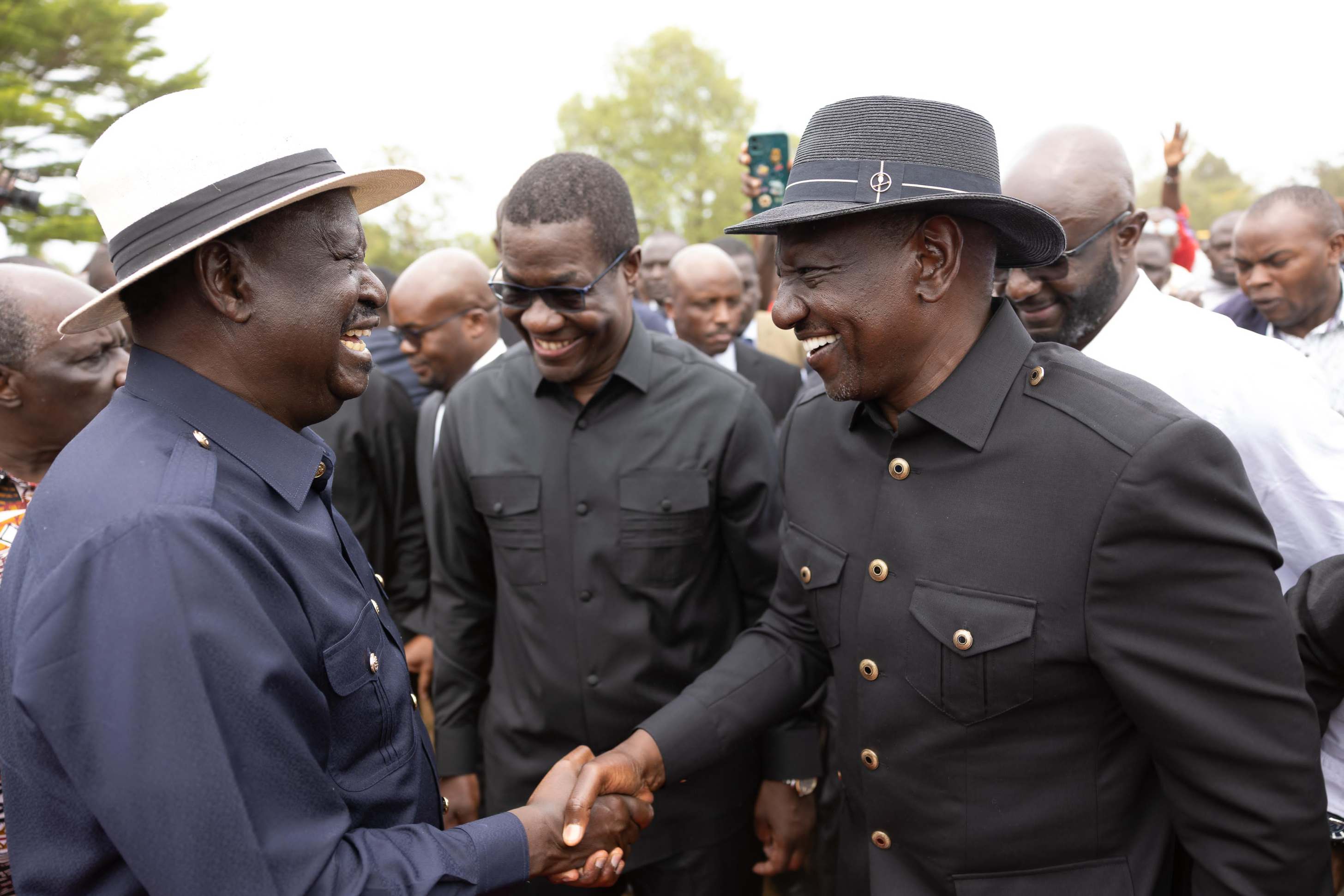Raila: I’ll support President Ruto until 2027

The former PM said the cooperation is meant to stabilise the country, not to forge a long-term political merger with the ruling UDA party.
ODM leader Raila Odinga has announced that he will continue backing President William Ruto until the end of the current term in 2027, but made it clear that this support is conditional and temporary.
Speaking during an interview at his Karen residence on Sunday, Raila said the cooperation is meant to stabilise the country, not to forge a long-term political merger with the ruling UDA party.
“We have said that we are in the broad-based government until 2027. We did not say that we are going to work with UDA beyond 2027. Those are issues that we will discuss at the appropriate time, and the decision will be made by party members, not Raila Odinga alone,” he said.
Preventing national chaos
Raila explained that the decision to work with the government followed last year’s deadly youth-led protests over economic hardship, governance failures, and police brutality.
According to him, Kenya was on the brink of chaos, and stepping in was necessary to avoid disaster.
“In 2023, we were in the streets raising very concrete issues about electoral justice, cost of living and corruption. The government responded with brutality, and we lost about 70 people. When we tried to honour them, no judge allowed us to hold a memorial. We eventually did it quietly,” he said.
Calls for dialogue
The ODM leader defended the push for national dialogue, arguing that Kenya’s problems won’t be solved by simply replacing leaders. He insisted that meaningful conversations are the only way to address the root causes of political and economic unrest.
“This problem will not be solved just by Ruto going home, because when he goes home, then you have Gachagua there. Tomorrow, you will now be shouting ‘Gachagua must go’, or ‘Kalonzo must go’. So, you must find a way of dealing with these issues, not abroad,” he said.
Raila said he does not shy away from dialogue, adding that in times of crisis, talking is the only alternative to anarchy.
“I do not run out of dialogue. People must talk when there is a crisis; people must find a solution to the crisis. If you don’t, you just get anarchy. That’s why we talk about dialogue,” he said.
Parliament has failed the people
Raila criticised Parliament, saying it has not provided solutions to national problems. He noted that Kenyans are now taking to the streets because they feel unrepresented.
“Our Constitution says the sovereignty of the Republic of Kenya rests with the people. They can exercise it either directly or through their elected representatives. What does it mean? We know how people elect representatives through the ballot, but how do 55 million people exercise direct sovereignty? This is dialogue. That article must have some meaning,” he said.
Grassroots-driven process
The former Prime Minister proposed a citizen-led national dialogue process, beginning at the polling station level. He said every Kenyan should have a chance to speak about the issues affecting them, with elected representatives moving the conversation through various levels up to a national summit.
“My suggestion is that you start at the polling station level, where everyone has the right to assemble and talk about the issues affecting them. From there, they elect representatives to go to the next level—the ward, sub-county, county, and then to a national conclave,” he said.
Inclusive national summit
He explained that the proposed national conclave would bring together elected delegates, religious and civil society leaders, MPs, workers’ representatives, and academics to present views from across the country.
“That now becomes a conclave that can talk about ‘we the people," Raila said.
He dismissed concerns about costs, saying the dialogue should be organised by the people themselves without government funding.
“People just come from their homes and sit down and talk. You don’t need any funding. If you now talk about who is going to fund it, then you are bringing the government into it. This is a people process,” Raila said.
Citizens lead, government implements
On how the dialogue outcomes would be implemented, Raila clarified that while citizens should lead the process, the government would play a role at the implementation stage.
He said the goal of the dialogue is to address major issues such as economic marginalisation, youth joblessness, and demand for transparent leadership.
“The biggest challenge facing Kenya today is how to expand economic opportunity and lift young Kenyans out of poverty and exclusion. Kenyans are yearning for programs and leaders that prioritise economic inclusivity, social justice, and political freedom,” he said.
